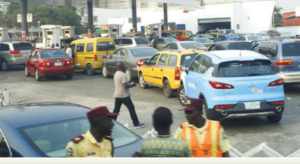Fuel Crisis: Nigerians Face Scarcity While Neighbors Benefit from Smuggled Supplies
Fuel Crisis: Nigerians Face Scarcity While Neighbors Benefit from Smuggled Supplies

Petrol Queues
As Nigerians continue to endure long waits at filling stations due to a severe fuel shortage, motorists in neighboring Benin Republic and Niger are taking advantage of smuggled Nigerian fuel. Investigations by FIRST CLASS GISTS reveal that in both countries, black market sellers offer cheaper rates compared to official filling stations.
Reports indicate that in Benin Republic, smuggled petrol is available at a lower price than at regulated stations. Our correspondents found that petrol prices at black market stalls in cities like Cotonou and Calavi were around 600CFA per liter, compared to 700CFA at official outlets. This price difference has led many drivers to favor the black market.
In contrast, the situation in Nigeria remains dire. Since President Bola Tinubu’s removal of the fuel subsidy on May 29, 2023, the country has experienced its fifth major fuel crisis. The subsidy elimination caused fuel prices to surge from approximately N200 to over N500 per liter, sparking panic buying, severe shortages, and increased living costs.
A second wave of scarcity hit in September 2023, followed by another in January 2024 due to distribution issues and rising global oil prices. By the time of President Tinubu’s first anniversary, the country faced its fourth fuel crisis, which exacerbated transportation costs and daily disruptions. The ongoing crisis in August marks the fifth significant shortage.
Meanwhile, in Benin Republic, a steady supply of fuel, both smuggled and officially sourced, has led to stable prices and the absence of long queues. For instance, the Benin Petro Filling Station in Cotonou showed minimal activity, with very few customers refueling. Despite the availability of fuel at these stations, black market vendors still thrive, offering fuel at lower rates and often attracting more customers.
In Niger Republic, smuggled fuel is also prevalent. In border town Illela, petrol prices are around N1,000 per liter, similar to those in Sokoto, while in Konni, Niger, smuggled fuel costs between N1,250 and N1,300 per liter. Despite the government’s efforts to regulate fuel distribution, black market prices remain competitive due to the disparity with government-supplied fuel.
Sources in Konni confirmed that smuggled fuel, often transported through unofficial routes, is sold at lower prices compared to government-supplied fuel, which is more expensive. This situation has led to a thriving black market, with traders and consumers preferring smuggled supplies.
In contrast, the situation in Nigeria continues to worsen, with persistent fuel queues across major cities including Abuja and Lagos. Motorists in Lagos are seen camping out at filling stations overnight, with many spending nights in their cars to secure fuel. Despite assurances from the Nigerian National Petroleum Corporation (NNPC) about resolving evacuation issues, the fuel crisis persists, leaving many Nigerians struggling to find fuel.
Overall, while neighboring countries benefit from the smuggling of cheaper Nigerian fuel, Nigerians face an ongoing struggle with fuel scarcity, driving up costs and causing significant disruptions to daily life.
TRENDING SONGS
 RCCG PASTOR ANGRY OVER CALLING Him“MR” INSTEAD OF “DR,” DECLARES CURSE ONLINE
RCCG PASTOR ANGRY OVER CALLING Him“MR” INSTEAD OF “DR,” DECLARES CURSE ONLINE
 NPMA Appeals to Nigerian Government for Compensation After Lagos Market Fire
NPMA Appeals to Nigerian Government for Compensation After Lagos Market Fire
 Rest Every Four Hours, FRSC Issues Safety Guide for Fasting Motorists
Rest Every Four Hours, FRSC Issues Safety Guide for Fasting Motorists
 NNPC Boss Ojulari Bags UK Energy Institute Fellowship
NNPC Boss Ojulari Bags UK Energy Institute Fellowship
 Shock in Anambra: Bride Disappears Moments Before Wedding
Shock in Anambra: Bride Disappears Moments Before Wedding
 Nigerian Woman Returns ₦330 Million Accidentally Credited to Her Account
Nigerian Woman Returns ₦330 Million Accidentally Credited to Her Account
 APC Don Reach Morocco?’ VeryDarkMan Reacts to Seyi Tinubu Poster
APC Don Reach Morocco?’ VeryDarkMan Reacts to Seyi Tinubu Poster
 Bride Breaks Down in Tears as Wedding Meals Were Kept Secretly While Guests Go Home Hungry
Bride Breaks Down in Tears as Wedding Meals Were Kept Secretly While Guests Go Home Hungry
 Odogwu by Day, Robber by Night: How Marriage Joy Turned Into Tragedy
Odogwu by Day, Robber by Night: How Marriage Joy Turned Into Tragedy
 Nigerian Officials Allegedly Pocket N4–6B Weekly Through Smuggling Cartels at Seme–Badagry Border
Nigerian Officials Allegedly Pocket N4–6B Weekly Through Smuggling Cartels at Seme–Badagry Border
Share this post with your friends on ![]()













